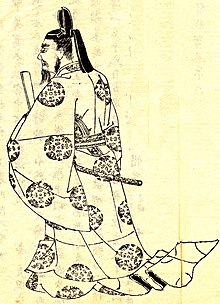Fujiwara no Michinaga

Fujiwara no Michinaga ( Japanese 藤原 道 長 ; * 966 in Kyōto ; † January 3, 1028 ( traditional : Manju 4/12/4) ibid) represents the climax of the rule of the Fujiwara rulers over the government of Japan .
Michinaga exercised de facto rule over Japan in the early 11th century . This can be seen from the fact that he was the father of four (non-officiating) empresses, uncle of two Japanese emperors, and grandfather of three other emperors.
He was the fourth or fifth son of Fujiwara no Kaneie with his wife Fujiwara no Tokihime . Two regents ( Michitaka and Michikane ) and two imperial wives ( Chūshi and Senshi ) were among his siblings.
As the youngest son of his father, he did not appear particularly at court until his two brothers died. He started his career at court when he was 15 years old. In 995, during the reign of Emperor Ichijō , his two older brothers Michitaka and Michikane died of an illness. He quarreled with Fujiwara no Korechika , Michitaka's older son. With the support of his sister Senshi, the mother of Ichijō, Michinaga managed to gain power, as well as the support of the majority of the court. He was promoted to Nairan , the emperor's secretary, who traditionally read through and sorted out all documents before the emperor read them himself. Although he was not yet regent, he was essentially the most powerful person at the court even then.
Although Ichijō already had an empress (a daughter of Michitaka), he claimed that there are two types of empresshood and that it is therefore legal to have two empresses at the same time. Michinaga's ambitions led him to make his own daughter, Shoshi, the second empress of Ichijō.
In 1000 Shoshi was proclaimed Chūgū empress and the existing empress, Teishi, was given the title of Kōgō empress. It was the first time in Japanese history that an emperor had two empresses. The power struggle between Korechika and Michinaga continued until Teishi's unexpected death. This sealed Michinaga's power, since Shoshi became the only empress after Teishi's death.
Shoshi had given birth to two princes who were later crowned Emperors Go-Ichijō and Suzaku . Michinaga's other daughters, Kenshi and Ishi, experienced similar fates as Shoshi and continued to secure Michinaga's power over the court.
After Ichijō abdicated due to illness, Emperor Sanjō ascended the throne. Although he was a nephew of Michinaga (the mother of Sanjō was another sister of Michinaga; she had died in Sanjō's childhood and he was relatively little influenced by his maternal line), he was already a mature man and had his own political Views. He was older than his predecessor Ichijo and in his thirties when he became emperor.
Michinaga's and Sanjō's opinions often contradicted each other. Michinaga therefore put pressure on Sanjō to resign. In 1016, Sanjō finally resigned with the agreement that his older son should be appointed as his successor. But Michinaga's political power and influence lead to the “voluntary” resignation of the Crown Prince. Michinaga was pleased with this decision and gave him his daughter (either Kenshi or Ishi) as his wife, thus ensuring that the prince would not be an obstacle in the future.
In fact, Michinaga never formally assumed the title of Kampaku ("Regent, Advisor"), but in reality his word was law, even after he officially withdrew from public life in 1019. He continued to direct the affairs of his son and successor, Fujiwara no Yorimichi . Michinaga is also known as the Midō Kampaku ( 御堂 関 白 記 ). This means that he had usurped the full power of a kampaku without necessarily referring to himself as a kampaku . He used the title of Sesshō ( 摂 政 , dt. Regent (for a minor / female emperor) ) in a short period from 1016 to 1017. In 1017 he handed this post to his heir Yorimichi.
Soon after, a succession of emperors began to retire to a monastery early in life and put their young sons on the throne, before ruling the country backstage. This tactic briefly allowed the emperors to wrest power from the Fujiwara clan, but only to later lose it to the Taira clan.
Michinaga left a diary , Midō Kampakuki ( 御堂 関 白 記 ), which is one of our essential sources of information about the high point of court life during the Heian period . The handwritten original of the diary was declared World Document Heritage in 2013 .
There is also the view that he was the inspiration for Prince Genji, the hero of the Genji Monogatari of the lady-in-waiting Murasaki Shikibu .
Individual evidence
- ↑ Fujiwara Michinaga in the Encyclopædia Britannica , accessed on November 12, 2013 (English)
- ↑ Midokanpakuki: the original handwritten diary of Fujiwara no Michinaga. In: Memory of the World - Register. UNESCO , 2013, accessed January 10, 2013 .
| personal data | |
|---|---|
| SURNAME | Fujiwara no Michinaga |
| ALTERNATIVE NAMES | 藤原 道 長 (Japanese) |
| BRIEF DESCRIPTION | Fujiwara regent in Japan |
| DATE OF BIRTH | 966 |
| PLACE OF BIRTH | Kyoto |
| DATE OF DEATH | January 3, 1028 |
| Place of death | Kyoto |